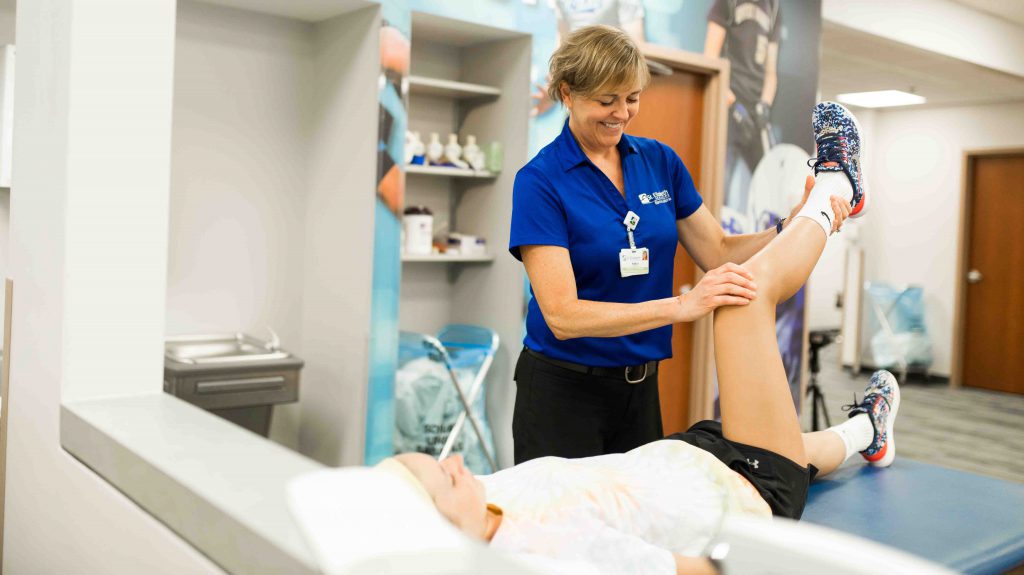Jumper’s knee, known as patellar tendonitis, is one of the most common knee injuries. It can affect athletes at every level. Patellar tendonitis and running often go hand in hand. This overuse injury is also common in other high-impact sports like soccer and basketball. It results from knee strain during continuous jumping and running motions. How you land can protect you from this common overuse injury, especially for athletes who frequently jump on hard surfaces.
Athletes participating in multiple sports are at high risk of developing this stress injury. Kathy Boehmer, PT, Specialty Program Coordinator for St. Elizabeth Healthcare Sports Medicine, says not only can jumper’s knee be prevented with proper training and rest, but if you recognize it early and start physical rehabilitation, it won’t slow you down for long.
“Jumper’s knee happens when the patellar tendon in the front of the knee is overstretched or overstressed (tendonitis knee). The overexertion can result in micro-tears in the tendon, which cause inflammation and can lead to pain,” says Boehmer.
What Are the Signs of Jumper’s Knee?
Identifying early symptoms of jumper’s knee is important in preventing further injury and making sure you recover faster. By paying close attention to the initial signs, you can take proactive steps toward managing this condition.
Key signs of jumper’s knee include:
- Difficulty bending or straightening your leg.
- Pain and tenderness around your kneecap, which worsens with activity.
- Pain during physical activities such as jumping, running, walking or using stairs.
- Swelling and inflammation around the knee area.
Recognizing Jumper’s Knee
With jumper’s knee, the injury to the tendon may come from the way you land. The injury is common in athletes who frequently jump on hard surfaces. It is considered an overuse injury and comes from the repeated stress of jumping and running.
Symptoms may include:
- Pain and tenderness around your kneecap.
- Swelling.
- Pain with jumping, running, walking or using stairs.
- Pain when bending or straightening your leg.
In addition to these symptoms, you may also notice knee stiffness, especially after resting or first thing in the morning. If you feel weakness or instability in your knee affecting your balance, this could also be a sign of jumper’s knee.
Can You Prevent Jumper’s Knee?
“When you jump, many athletes do not land properly,” says Kathy. “The knees collapse, or bend, inward putting more force through the tendon over your kneecap. This may cause micro-tearing which leads to pain and inflammation.”
Learning to land correctly at the end of a jump can protect you. Another key is strengthening your hips and core muscles with resistance training. By developing these muscles, you can help prevent this stress injury. You should also keep your hamstrings and quadriceps flexible and give your body rest when you feel pain.
Boehmer says the St. Elizabeth Healthcare ACL Injury Prevention Program, a free resource developed by physical therapists and orthopedic surgeons, focuses on helping athletes strengthen their knees to prevent injury. The program offers in-season and pre-season maintenance exercises to help keep you in the game. The Jump Training and Landing Stabilization exercises taught through this program are a great way to practice good jumping or landing techniques.
Jumper’s knee usually develops gradually, so getting treatment at the first sign of injury is important.
What Are the Treatments for Jumper’s Knee?
Boehner recommends using different methods to treat jumper’s knee. “If your knee hurts, avoiding painful activity is the best treatment. Rest gives the tendon time to heal. Proper footwear designed for your sport may also help decrease your symptoms.” Other treatments may include:
- Elevating your knee.
- Ice therapy.
- Nonsteroidal anti-inflammatory drugs.
- Patellar tendon strapping (strap or band to absorb force).
- Physical therapy for patellar tendonitis.
Get Back in the Game With the ACL Injury Prevention Program
If you experience knee pain, St. Elizabeth Healthcare’s ACL Injury Prevention Program can help. Call our office at (859) 212-5600 and schedule an appointment today with a St. Elizabeth Sports Medicine provider.

